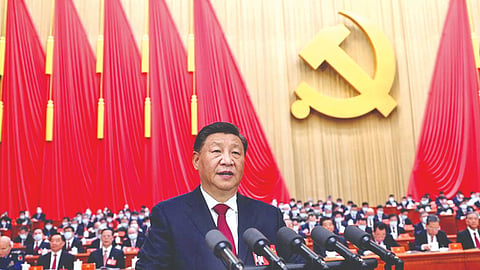

By WILLIAM YANG
Last week, President Xi Jinping struck a triumphant tone in his speech at the opening of the 20th National Congress of the Chinese Communist Party (CCP) by highlighting what he said were the party’s achievements over the last five years. Additionally, Xi promised a series of reforms and changes that he said he hopes will direct China toward the goal of national rejuvenation.
Wen-Ti Sung, a lecturer in Taiwan Studies at the Australian National University (ANU) and currently based in Taipei, said Xi’s speech was a lot less escalatory than some analysts might have been expecting. “He talks about the ‘complete reunification of the motherland ought to happen’ and ‘must happen,’ but he is very vague on how he intends to make it happen,” the lecturer told DW.
“While some Taiwanese observers fear Xi could be laying out specific new strategies to solve the Taiwan problem, Xi’s speech signals a greater desire to hold onto continuity rather than change. He talked about firm resolve and strong capabilities to oppose Taiwan’s independence, but he didn’t talk about intent, plan, or timetable. The intent is to make it even more ambiguous as to the timeline and urgency of unification with Taiwan,” he added.
Apart from emphasising the CCP’s success in overcoming challenges, Xi also highlighted “rapid changes in the international situation,” praising the party’s efforts to “uphold international fairness and justice, advocate the practice of genuine multilateralism, and clearly oppose all hegemony and power politics.” As geopolitical tension between China and US-led Western countries rises, Ian Chong, a political scientist at the National University of Singapore (NUS), says the emphasis on multilateralism means China will continue to challenge and compete with the United States. “When talking about multilateralism, it often means Beijing will work through international institutions, notably UN agencies, to counter what it sees as US influence,” he told DW. While the speech is being largely viewed as expressing a continuation of the existing policies under Xi’s rule over the last decade, Chong from the NUS says the Chinese leader’s emphasis on discipline and ideology was notable. “One of the ways that Xi Jinping tries to deal with challenges, including the slowing economy and China’s rivalry with the US, is to emphasise party discipline and ideology,” he told DW.
Dexter Roberts, a senior fellow at the Atlantic Council, said Xi didn’t offer more insights about the concept of “common prosperity” in his speech. “It has been a statement of purpose without a lot of information, and there is not a lot of fleshing out about how they are actually going to do it,” he told DW.
“I also think common prosperity has an element in the leadership and Xi’s mind of punishing the rich people. A lot of the crackdowns on entrepreneurs and big tech companies in China have concerns about data and economic security,” he added. However, Iris Pang, the ING Group’s chief economist for Greater China, thinks that Beijing is trying to rebrand common prosperity by highlighting the need for China to build world-class education. “I believe they are looking for world-class education, and this will provide opportunities for the younger generation to climb the wealth ladder and they have a channel to do that properly,” she told DW.
Roberts from the Atlantic Council says Xi’s repeated emphasis on “self-reliance” shows Beijing wants to prove it can “go it alone,” even though it may be challenging. “I don’t think Xi realises how difficult it would be for them to indigense the high-tech side of their supply chain,” he told DW.
This article was provided by Deutsche Welle
Visit news.dtnext.in to explore our interactive epaper!
Download the DT Next app for more exciting features!
Click here for iOS
Click here for Android